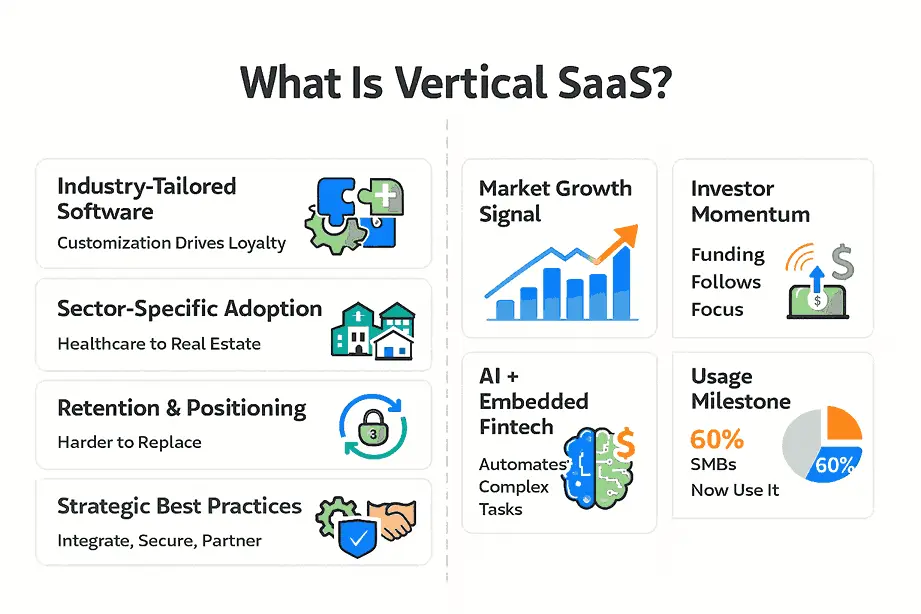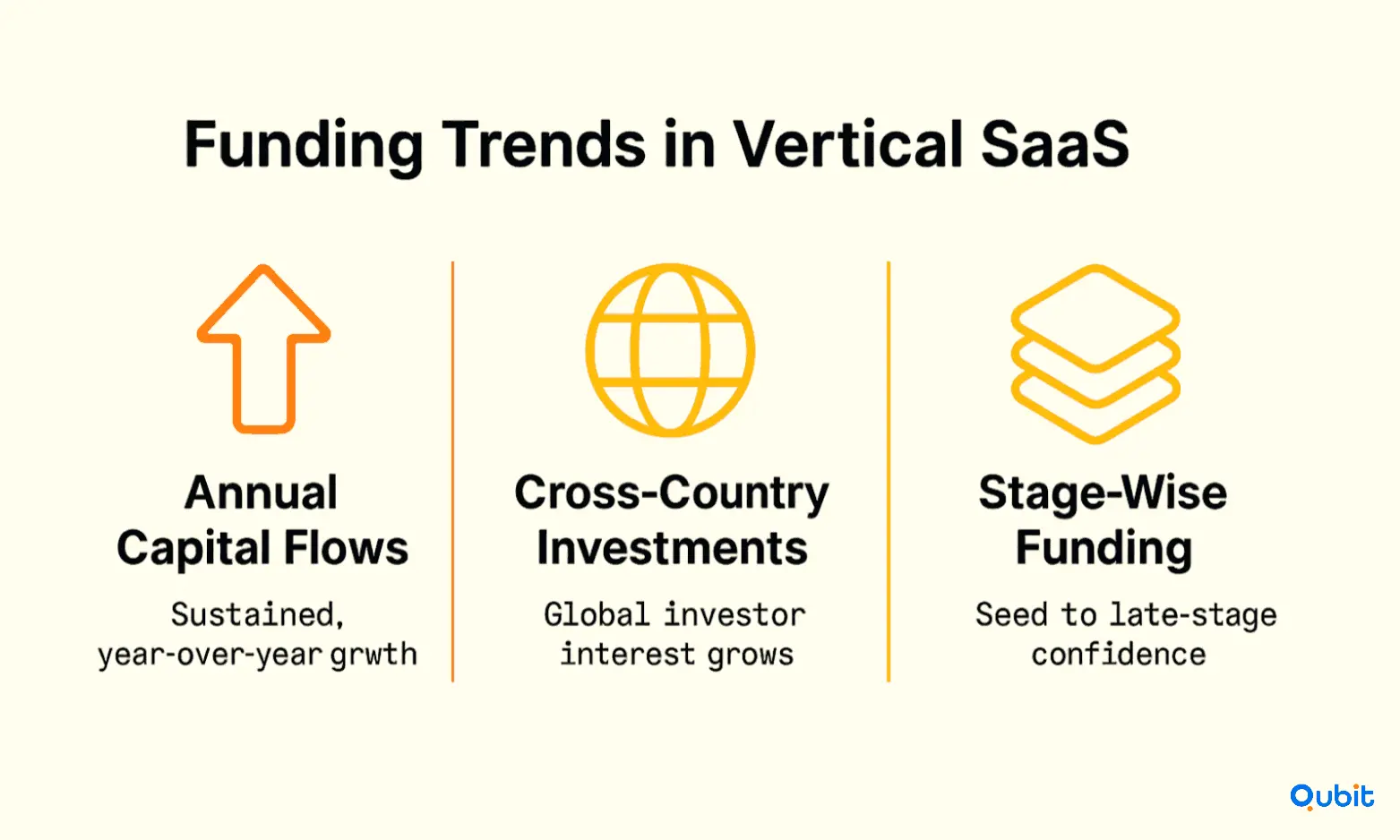Did you know the Vertical SaaS market is rapidly evolving around sector-focused strategies? Unlike traditional, broad-based SaaS models, Vertical SaaS targets specific industries such as healthcare, real estate, and education. This focus lets companies solve niche operational problems, streamline workflows, and unlock sector-specific growth opportunities.
Recent years have seen remarkable momentum: $207.39 billion in VC capital has flowed into SaaS startups, with these companies now collectively valued at around $273 billion. This scale signals strong investor confidence and the enduring potential of vertical SaaS models.
This article breaks down the fundamentals of Vertical SaaS, its market potential, and how businesses can secure funding to grow in this increasingly competitive space. Let’s jump in.
What is Vertical SaaS?
60% of small businesses now rely on vertical SaaS platforms for daily operations. This shift highlights the practical impact of industry customization and underpins broader market acceptance. Vertical SaaS, or industry-specific software solutions, has emerged as a transformative force in the software-as-a-service market.
Its tailored approach to addressing the unique needs of specific industries has fueled its rapid adoption and positioned it as a key driver of innovation.

Industry-Specific Customization
One of the primary factors driving vertical SaaS growth is its ability to deliver highly customized solutions for niche markets. Unlike horizontal SaaS platforms that cater to a broad audience, vertical SaaS focuses on solving industry-specific challenges.
For example, healthcare, real estate, and manufacturing sectors benefit from software tailored to their operational workflows, compliance requirements, and customer demands. This precision not only enhances efficiency but also fosters deeper customer loyalty.
Competitive Positioning and Customer Retention
89% of executives and IT leaders now view vertical SaaS as the sector's future. This consensus highlights strong belief in its retention and positioning benefits.
Vertical SaaS providers often enjoy a competitive edge due to their specialized focus. By addressing pain points unique to a particular industry, they create a value proposition that is difficult for generic solutions to replicate. This specialization also contributes to higher customer retention rates, as businesses are less likely to switch to platforms that lack the same level of customization.
Best Practices for Vertical SaaS Success
- Develop deeply integrated solutions addressing unique industry workflows and compliance requirements for defensible market positions.
- Offer tailored customer support and proactive security frameworks to build trust and reduce customer churn.
- Leverage strategic acquisitions and partnerships to accelerate growth and broaden your vertical SaaS offerings.
Market Valuation and Adoption Rates
The market valuation of vertical SaaS continues to climb, reflecting its growing adoption across industries. Businesses increasingly recognize the advantages of investing in software that aligns closely with their operational needs. This trend is further supported by advancements in cloud computing and AI, which enhance the scalability and functionality of vertical SaaS platforms.
Role of AI and Embedded Fintech in Vertical SaaS
Building on market valuation trends, vertical SaaS platforms increasingly leverage AI and embedded fintech to automate complex, industry-specific workflows. These technologies streamline documentation, compliance, and payments, reducing manual labor and increasing operational efficiency.
By integrating smart automation and financial services, vertical SaaS providers deliver higher retention and unlock new revenue streams. This approach positions vertical SaaS as a leader in transforming traditional business processes across diverse sectors.
Increased Investor Activity
Investor interest in vertical SaaS has surged in recent years, driven by its strong growth potential and profitability. Sector-specific software funding aligns with trends observed in AI SaaS funding, revealing nuanced shifts in investments for AI-powered platforms. This influx of capital enables vertical SaaS companies to innovate further and expand their market reach.
Top Companies in Vertical SaaS
Below is a curated list of some of the top Vertical SaaS companies, showcasing their formation trends and market presence.
1. Veeva Systems
Veeva Systems has become a cornerstone in the life sciences industry, providing cloud-based solutions for pharmaceutical and biotech companies. Founded in 2007, the company has expanded its global footprint, serving clients across North America, Europe, and Asia. Veeva’s funding journey is notable, with its IPO in 2013 marking a significant milestone in its growth.
2. Procore Technologies
Procore Technologies focuses on the construction industry, offering project management software that streamlines workflows and enhances collaboration. Established in 2002, Procore has grown into a global leader, with a presence in over 125 countries. The company’s funding stages include multiple rounds of venture capital before its IPO in 2021.
3. Toast
Toast specializes in restaurant management software, catering to the unique needs of the foodservice industry. Since its inception in 2011, Toast has rapidly scaled, becoming a go-to solution for restaurants across the United States. Its funding history includes several high-profile rounds, culminating in a successful IPO in 2021.
These companies exemplify the potential of Vertical SaaS to transform niche markets. Their success stories highlight the importance of industry-specific solutions, strategic funding, and global scalability.
Funding Trends in Vertical SaaS
The Vertical SaaS sector has seen a notable surge in funding activity, reflecting its growing importance across industries. Recent data highlights several key trends shaping this dynamic space, including annual capital flows, cross-border investments, and stage-specific funding patterns.

1. Annual Capital Flows: Sustained Growth
Investors continue to pour significant capital into Vertical SaaS startups, with annual funding volumes showing consistent growth over the past few years. This trend underscores the sector's ability to address niche industry needs with tailored software solutions. The rise of specialized platforms catering to industries like healthcare, real estate, and logistics has particularly driven this momentum.
Backing this trend, VC funding increased 7% globally, driven by a late-year surge in major deals. This influx demonstrates sustained investor momentum powering vertical SaaS expansion.
2. Cross-Country Investment Patterns
Global interest in Vertical SaaS is evident, with cross-country investments becoming increasingly common. Startups in emerging markets are attracting attention from international investors, who are keen to tap into localized solutions with global scalability. This trend not only diversifies the funding landscape but also fosters innovation by encouraging knowledge exchange across regions.
3. Stage-Wise Funding Breakdowns
Funding activity spans all stages, from seed rounds to late-stage investments. Early-stage funding remains robust, as investors seek to identify and support promising startups in their formative years. Meanwhile, late-stage funding rounds are growing larger, reflecting investor confidence in the scalability and profitability of mature Vertical SaaS companies.
Recent Rounds Spotlight Investor Confidence
Recent funding rounds provide a clear snapshot of evolving investor priorities. Startups offering AI-driven analytics, automation tools, and industry-specific integrations have secured significant backing.
Top Investors in Vertical SaaS
The rise of Vertical SaaS has attracted a wave of specialized investors who recognize the potential of tailored software solutions for specific industries. Prominent venture capital firms like Bessemer Venture Partners and Accel have been instrumental in funding these niche platforms, focusing on their ability to address unique market needs. Their investments often prioritize scalability and the capacity to dominate underserved sectors.
Strategic investors, including industry leaders such as Salesforce Ventures, bring more than capital to the table. They contribute deep domain expertise, enabling startups to refine their offerings and accelerate growth. These partnerships often result in innovative solutions that redefine industry standards.
Your examination of niche funding opportunities resonates with the insights presented in software investment trends, where a wider perspective on investor priorities is offered.
IPOs in Vertical SaaS
IPO activity reflects fast-growing demand. Global SaaS revenues are projected to exceed $369 billion by 2025. Such expansion provides fertile ground for more vertical SaaS firms to pursue public listing.
Several leading companies in this niche have successfully entered public markets, showcasing their ability to scale and meet investor expectations. This transition highlights the sector's robust growth, driven by tailored solutions that address specific industry needs.
Investor confidence in Vertical SaaS is evident, as these companies consistently demonstrate strong revenue models and market adaptability. Their IPOs not only validate the demand for specialized software but also pave the way for future innovation within the sector. As more Vertical SaaS firms prepare for public offerings, the industry is poised to attract even greater attention from global investors.
This trend underscores the importance of understanding market dynamics and the unique value propositions these companies bring to their respective industries. Vertical SaaS IPOs are not just milestones, they're shaping the future of software solutions.
College Impact on Vertical SaaS
Rapid SaaS growth puts startups at risk. 70% of SaaS startups fail from premature scaling. College-backed mentorship and validation programs can mitigate this risk, boosting market survival rates.
Academic institutions play a pivotal role in shaping the future of Vertical SaaS (Software as a Service) startups. Universities and colleges often serve as incubators for innovation, providing students and researchers with access to cutting-edge technology, mentorship, and funding opportunities. These environments foster creativity, enabling the development of SaaS solutions tailored to specific industries, such as healthcare, education, or manufacturing.
One key factor driving this impact is the collaboration between academia and industry. Many universities partner with businesses to offer real-world problem-solving experiences, which can lead to the creation of niche SaaS products. Additionally, entrepreneurship programs within colleges equip students with the skills needed to launch and scale their startups effectively.
Early-stage funding dynamics are also influenced by academic institutions. University-affiliated incubators and accelerators often provide seed funding and resources to promising SaaS ventures. This support not only helps startups gain traction but also attracts external investors who recognize the potential of these academically nurtured innovations.
Key Industries Benefiting from Vertical SaaS
Vertical SaaS industries are transforming how businesses operate by offering tailored solutions for specific sectors. Healthcare, manufacturing, legal, real estate, and retail are among the top adopters of these specialized platforms.
Healthcare organizations rely on Vertical SaaS to manage compliance with stringent regulations like HIPAA while streamlining patient data workflows. Manufacturing companies benefit from tools designed to optimize production schedules and supply chain management. Legal firms use these solutions to simplify case management and ensure adherence to jurisdiction-specific requirements.
Consumer Trends Creating New Vertical SaaS Niches
These industry transformations are increasingly influenced by changing consumer trends, such as the rise of electric vehicles and aging populations. Vertical SaaS providers respond by developing specialized platforms for emerging service sectors like EV maintenance and elder care. Adapting to these shifts enables companies to capture new market opportunities and address evolving customer needs. This responsiveness is key to sustaining growth and relevance in dynamic industries.
Real estate professionals leverage Vertical SaaS to automate property listings, client communications, and transaction tracking. Retail businesses, on the other hand, utilize these platforms to enhance inventory management and deliver personalized customer experiences.
AI-powered verticalization is a key driver of this growth. By automating unstructured data and streamlining industry-specific workflows, Vertical SaaS platforms are unlocking new possibilities for predictive analytics and advanced automation. For example, machine learning models can now provide actionable insights tailored to unique business processes, fostering innovation and scalability.
Conclusion
Targeted funding strategies and market specialization are pivotal for Vertical SaaS success. Throughout this blog, we’ve explored key strategies to optimize funding approaches and align them with niche market demands. By focusing on tailored solutions and understanding the unique needs of specific industries, businesses can unlock sustainable growth opportunities.
Strategic decision-making, backed by advanced insights, remains essential for scaling operations and securing the right investment partners. Whether it's refining your market focus or identifying investors who align with your vision, these strategies empower businesses to thrive in competitive environments. Aim your raise where it wins, use our SaaS fundraising services to zero in on fit, sharpen the story, and close faster.
Key Takeaways
- Vertical SaaS market valued at $94.86 billion with strong growth projections.
- Industry-specific customization drives higher customer retention and competitive advantages.
- Funding trends reveal significant annual and cross-regional capital flows.
- Heightened investor activity, M&A, and IPO movements highlight dynamic market opportunities.
- Specialized funding solutions like RevTek Capital’s offerings provide tailored capital support.
Frequently asked Questions
What is vertical SaaS?
Vertical SaaS refers to software designed for a particular industry or niche, like healthcare or real estate. It delivers tailored features to meet sector-specific needs, such as HIPAA compliance or legal case management. These solutions drive operational efficiency and support industry growth.






